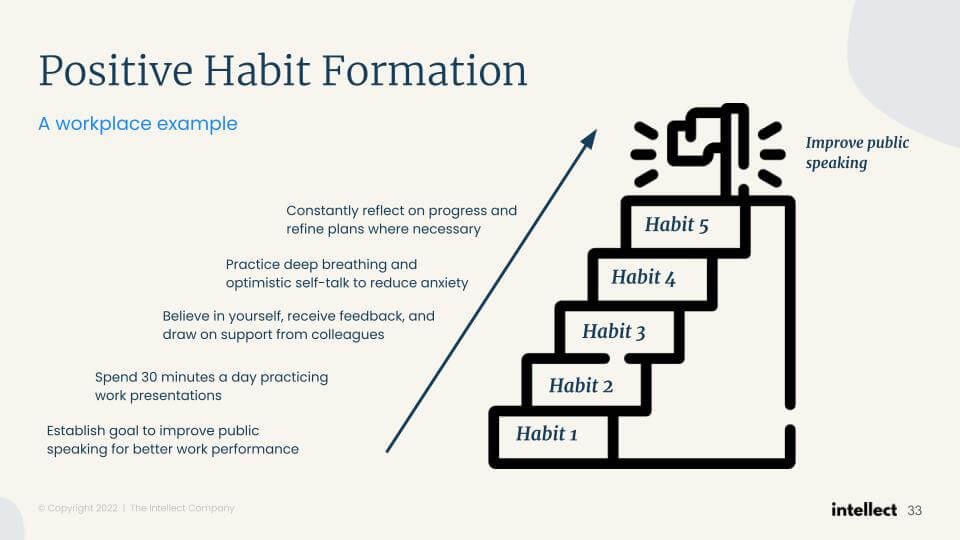Before we set those SMART goals for 2024, how did your new year’s resolutions in 2023 go?
If you’ve fallen short of fulfilling them, you’re not alone. A study conducted by the University of Scranton found that 92% of people who make new year’s resolutions don’t achieve them. In fact, January 17 has been dubbed Ditch Resolutions Day, with certain studies showing that many quit chasing their goals around this time.
The missing piece of the puzzle? Positive habit formation. But, before we delve into that, let’s examine three common reasons why new year’s resolutions flop.
Poor awareness of the underlying reasons for our goals: Running thrice a week helps us to stay healthy, but why does that matter? The underlying reason could be to match your children’s energy when you take them outdoors.
A lack of accountability and structure: We often set vague goals that we’re not sure how to reach. You may want to “be fitter” or “save more money”, but what does that look like on a daily, weekly, and even monthly basis?
Self-sabotaging or discrediting beliefs: Self-talk like “I’d never be able to do it” or “It’s too much work” dampens your spirits and discourages you from putting in your best effort.
The truth is, a lot of us are really crummy at creating practical goals. We have a tendency to set ourselves up to fail right from the get-go, whether by creating unrealistic (”I want to run 10km every day”) or ambiguous goals (“I want to lose weight”).
“If you set a goal that you have no hope of achieving or which discourages you from achieving it, you feel demoralised. It erodes self-confidence,” said Intellect’s consulting specialist Nicole Ooi during an internal webinar titled “Starting the Year Right: Building Meaningful Resolutions and Habits.”
Step 1: Setting SMART goals

You would have heard of SMART goals:
Specific: Your goal must be clear and well defined to provide sufficient direction.
Measurable: Include precise outcomes to measure your degree of success.
Achievable: Setting goals you have no hope of achieving erodes your confidence.
Relevant: Goals should be aligned with the direction you want your life and career to take.
Timely: Your goals must have a deadline.
An example would be to:
S: Read 12 books in 2024
M: By reading for 30 minutes 5 times a week
A: Either when commuting or before bedtime
R: To build my vocabulary and improve my writing skills
T: Before taking on editorial tasks at the end of the year

With that motivation, you may be more compelled to follow through than if you were reading the Game of Thrones series for leisure.
Now, let’s apply the above to other goals in the workplace.
Rather than: I want to learn a new software.
Say: I will set aside an hour every Wednesday from 5 to 6 pm to learn the tool. After 5 weeks, I will be able to use basic functions to streamline my work.
Rather than: I want to be better prepared for presentations.
Say: I will block 2 hours out 3 days before to prepare for it. I will achieve this goal if I feel more relaxed during my presentation.
Once you’ve got a SMART goal or two in mind, the hard part is seeing those goals through. The journey is littered with obstacles, detours, and negative self-talk that will tempt you to give up. That’s where healthy habits come in.
Step 2: Establishing habits
The key to realising your new year’s resolutions, or any goal for that matter, is positive habit formation.
“Many people focus on willpower or self-control as their personal or internal drivers. But actually, when you look at it, having that consistency is more likely to keep you going,” said Nicole.
A study by Wood and Neil in 2007 suggested that we’re not motivated by goals alone. Instead, we’re driven from day to day by habits we’ve put in place.

To make habits stick, keep them:
Easy: Consider if you’re well-placed to sustain the habit. Walking for 15 minutes every day, for instance, would hardly disrupt your schedule – you could even do it when running errands or heading out for lunch – and does not require you to pay for equipment or commit to a gym membership.
Attractive: Consider why this habit is important to you. How will it change your everyday life? What impact will it have on your well-being? Perhaps you work a sedentary office job, and walking for 15 minutes every day helps you sort out your thoughts and get the cardiovascular exercise you need to stay healthy.
Obvious: Schedule your new habit at a time and date that is easy to remember. You can opt to walk the dog at 6pm every day or replace existing habits with new ones, like taking the stairs instead of the elevators. Cues enforce habits, which in turn trigger desired behaviours.
Satisfying: Develop a personal reward system. Some people find the endorphins of taking a nice long walk to be enough, but if you need more convincing, you could listen to your go-to podcast while walking or treat yourself to an episode of your favourite Netflix series afterwards.
Habits are building blocks that move us towards a set goal, but it isn’t always smooth-sailing. Stress, emergencies, and even a long vacation can get in the way, which is why preparing for and managing obstacles is important.


“Be kind to yourself when you have to be. Encourage and empower yourself to keep working on it and view setbacks as learning opportunities,” Nicole said.
Step 3: Staying on track
Self-talk
Mindset plays a big role in both habit formation. Positive self-talk has been found to reduce stress and distress, increase self-confidence and vitality, and build up resilience when the going gets tough. This could sound like:
“I may have missed a day, but I can always pick up where I’d left off.”
“I have the skills and knowledge for my dream job.”
“I deserve and am capable of working towards a promotion.”
As negative emotions such as sadness, anger, guilt, and even shame could arise, be mindful of falling into the toxic positivity trap. Remind yourself that since you have set a SMART goal, it must be within your grasp.
Structure
Structure in the form of cues, triggers, and contexts help you to stay consistent. Besides timing your walk with the end of a work day, you could remind yourself through automated alarms or notes on the wall. Sticking a post-it that says “remember to take the stairs!” on your mirror, for example, is a helpful reminder.
Social support

Last but not least, remember that you are not alone.
“Finding a network of people who can provide guidance and support is critical,” Nicole said. “Hard work in isolation is incredibly difficult. The bigger your goals, the more social support you need to be successful.”
This social support can be a family member, a friend who is working towards the same goals as you, or a mentor, colleague, therapist, or coach who can give you feedback.
When your habits don’t work out
According to Intellect’s Clinical Psychologist Linda Rinn, we need to plan for days where we could “fall off the wagon” to move past them and keep going. For starters, when you feel unmotivated, doing an easier alternative makes a difference.
“For example, if your goal is to go running and you really can’t get yourself to do it one day, go for a walk instead. If even that feels too much, just walk one lap around your apartment. It’s all about doing something, even if it’s small,” she said.
The goal is not perfection but consistency. While we pride ourselves on “streaks”, we would realistically miss a day every now and then. But, according to a study published in the European Journal of Social Psychology, missing your habit once has no impact on your long-term ability to stick to the habit.

“While people and habits differ, a good rule of thumb is never skipping your new habit twice in a row,” she said. If your habit of running in the morning was thwarted by the weather, find a way to pick up where you’d left off the next day even if that means running on the treadmill instead.
If all else fails, the problem could be one of the following:
The steps towards your goals are still too big
“When we are making great progress but eventually ‘fall off the wagon’ without getting back on, that’s usually an indicator that the steps we have set up for ourselves are not achievable in the long-run. It hasn’t fully become part of your routine,” said Linda. If running thrice a week proves impossible by the third month, doing so once or twice a week could be more sustainable.
You have not fully set up the “why”
Say, you’re keeping fit to match your children’s energy when taking them outdoors. Now, write this goal down and take it one step further by asking, “and why is that important to me?” It could be that you’re busy with work and are trying to spend more quality time with them on the weekends. Chances are, your answer to the second “why” may be more emotional and therefore motivational.
Getting help along the way
In 2010, entrepreneur Derek Sivers famously proclaimed that you should keep your goals to yourself, but asking for help in pursuit of your goals never hurt anyone.
Behavioural coaching, for starters, helps people set and work towards SMART goals. It allows you to break out of the fog and determine what it is you truly want, what’s holding you back, and how you can get from point A to B. A coach is not only an accountability buddy, a listening ear, and a sounding board; they also offer techniques you may not have otherwise picked up.
Learn more about behavioural coaching here.





